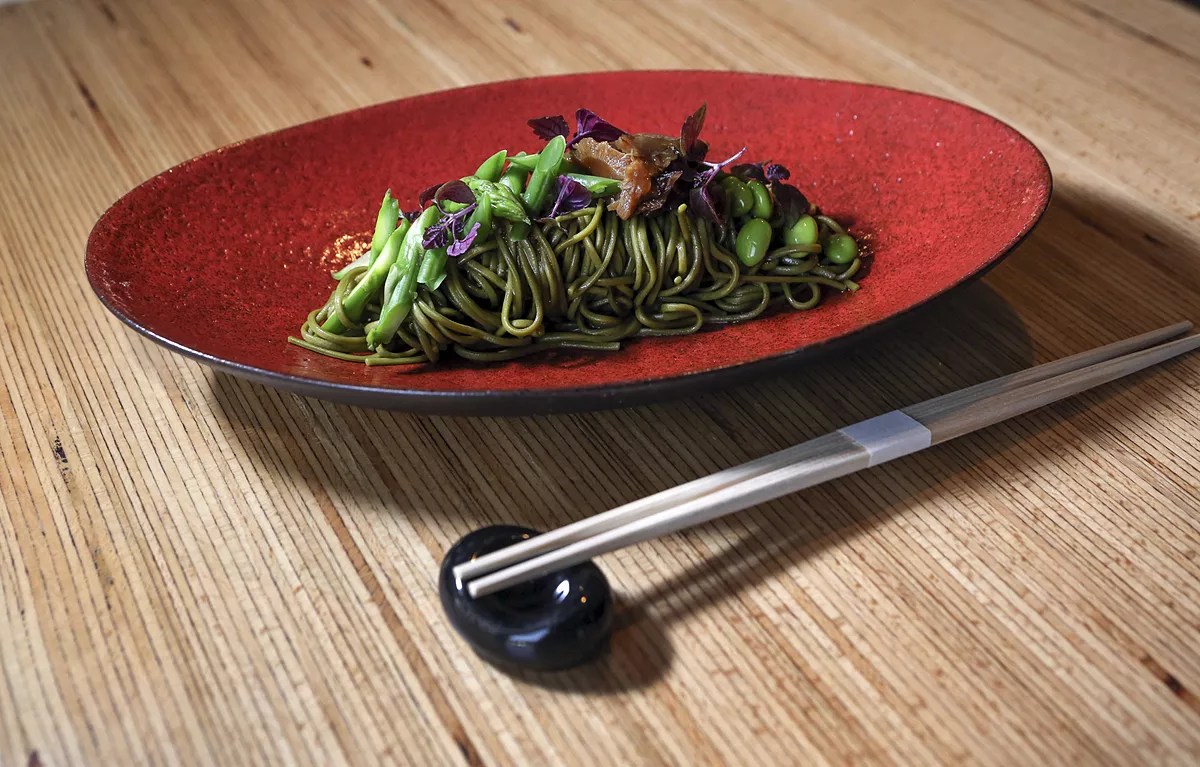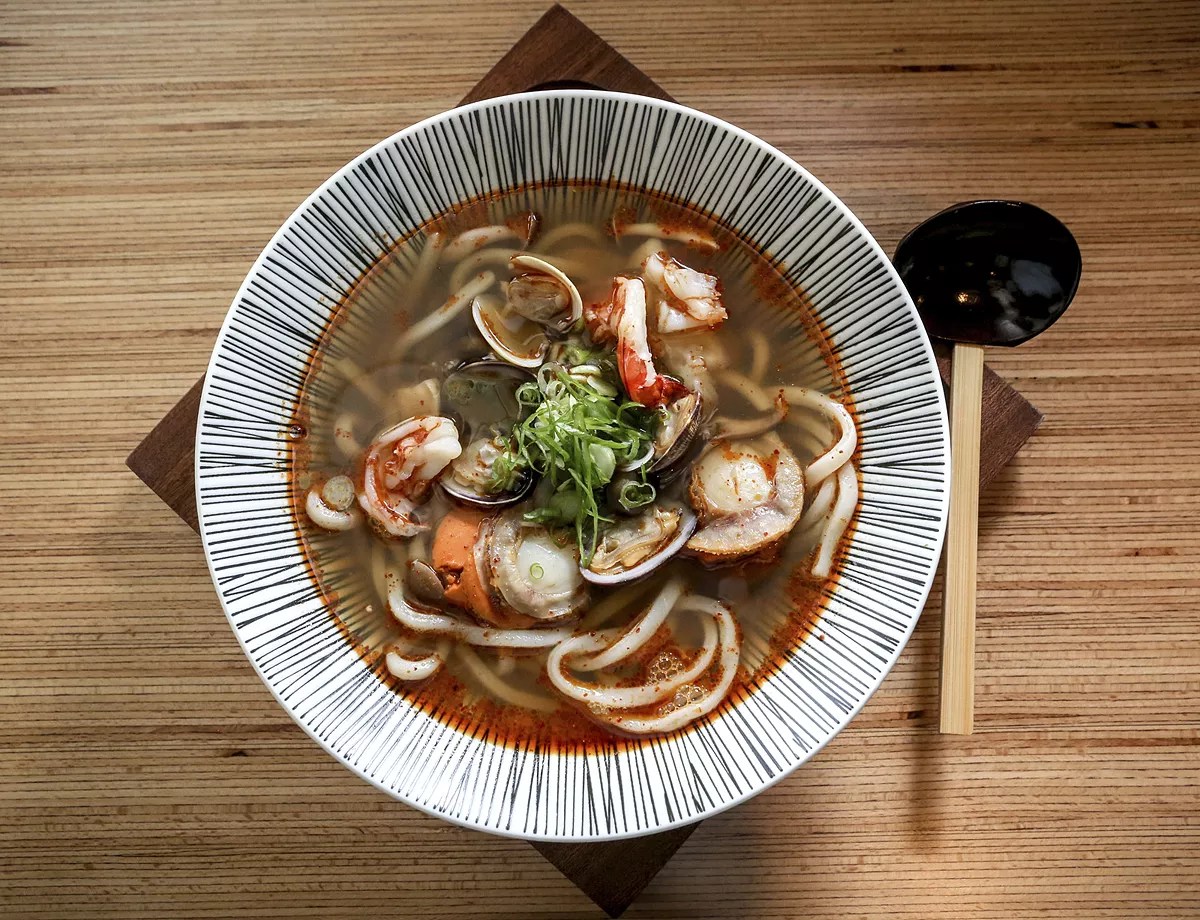
Photo by CandaceWest.com

Audio By Carbonatix
A wide bowl striped with narrow white and black lines arrives filled with a knot of thick, opaque udon noodles sturdy enough to grip with chopsticks but delicate enough to absorb the spicy ocean tonic infused with ginger and kelp in which they float. The soup is filled out with meaty Manila clams, just barely cooked pink shrimp, and two tender scallops that boast a briny sweetness and the firm meatiness of the best octopus.
The dish is a highlight at chef Shuji Hiyakawa’s Dashi, a sleek 80-seater inside the River Yacht Club on the Miami River. It’s pleasantly tucked away from the thumping techno of the outdoor bar and patio that abut the waterway. Instead, down-tempo lounge music and water lapping against passing boats provide the soundtrack. Rough wooden tables have been polished to a smooth finish and are surrounded by gray and blue suede chairs and banquettes. Two chest-high communal tables topped with mammoth marble slabs offer a pristine view of the sushi bar, where a pair of chefs work in near-monastic silence.
Like so many of the best dishes, it offers a perfect contrast of sweet and salty.
Not long ago, Hiyakawa, who trained under Iron Chef Masaharu Morimoto and was most recently the executive sushi chef at the Seminole Hard Rock Hollywood, had other plans. Shortly after leaving his Broward post, he announced he would open a restaurant called Wabi Sabi in the MiMo District. Delays forced him farther south. On the Miami River, he offers a brief list of concisely prepared dishes alongside an impressive array of sushi including many distinctly Japanese options, such as sea bream, golden eye snapper, and vinegar-cured mackerel, which have become the benchmark for any sushi place that hopes to be taken seriously.
The result for Hiyakawa is a place that will surely have a longer lifespan than Morimoto’s short-lived eponymous Miami Beach restaurant. Dashi excels because of precise execution that doesn’t cloud primary flavors with excess fussiness.

Beef tataki
Photo by CandaceWest.com
Such precision is obvious in the tempura. Though many Americans see it as just fried food, in Japan it is approached with the same obsessiveness as ramen and sushi. Here, the fish included in the dish rotates daily. One night it was a disappointing Chilean sea bass, but another evening brought two fatty, meaty lobes of cod encased in a blisteringly hot and crisp shell without a touch of grease.
The challenge is how to move the tempura, along with sweet soy, ginger, and grated daikon radish, into your mouth with the crunch intact. Here, the shell works magic on a snappy okra pod and a loamy shiitake mushroom cap. Though the price is steep – two small pieces of cod and four pieces of vegetables cost $18 – this stuff sets a new standard. You will expect more from every tempura henceforth.
The simply prepared beef tataki leaves nothing to distract from the rare, razor-thin meat’s smoky char. Soy-marinated onions serve as a seasoning and lend some freshness to the fatty meat, while crisped shallots add a pleasant textural contrast. A pair of lamb chops makes a similar move. The dish contains only three components: two thick-cut chops, rosemary, and a knob of pale-green wasabi. When the plate arrives, a server removes a cover to reveal the meat resting atop a sparse nest of the smoldering herb. The move cleverly whets your palate for what’s to come and imprints the rosemary’s flavor and aroma in your mind. But it’s the combination of the rich, fatty meat and the biting wasabi that leaves the biggest impression. Be sure to advise your server if you don’t want it served rare.

Spicy seafood udon
Photo by CandaceWest.com
Hiyakawa’s sushi and sashimi offerings are on par with those from the city’s better purveyors. The list of about two dozen choices includes many flown in from Japan, including the bright and briny sea eel called anago that this writer recalls seeing in Miami only at Kevin Cory’s Naoe. There is also an ingenious Atlantic smoked trout. The fish’s salty and meaty sweetness pairs perfectly with firm grains of rice that are almost perfectly seasoned. When the sushi is delivered, servers announce the rice has been seasoned with the kelp called konbu, sugar, and two kinds of vinegar. Soy sauce is available upon request.
Saba, a cured mackerel dish, is the Japanese analog of smoked trout. Hiyakawa’s preparation seems to give the fish more time to marinate in vinegar, leaving it a bit firmer and more aggressively seasoned than usual but still with a pitch-perfect balance of spice and the fish’s fatty oils.
Though Dashi veers into Americanized sushi in its rolls section, which lists choices such as the rainbow and California, there are some worthwhile options. Don’t overlook the one filled with Hokkaido scallops dotted with tobiko. Like so many of the best dishes, it offers a perfect contrast of sweet and salty thanks to delicate bivalves and bright-orange fish eggs.

Chef’s sashimi
Photo by CandaceWest.com
Still, it’s impossible not to be drawn back to the noodles. Hiyakawa also makes narrow soba noodles out of buckwheat blended with green tea. The combination creates a deeply grassy flavor. After the noodles are doused in dashi and a bit of soy, they are woven with bits of blanched asparagus, shiitake mushrooms, and firm edamame, yielding intensely earthy, umami-rich bites.
Hopefully, the food at Hiyawaka’s forthcoming Wabi Sabi in the MiMo District will be just as precise. Though the plan was to serve food similar to Dashi’s, construction problems led him to shift to a more casual, takeaway concept. “Think Japanese comfort food: a bowl of noodles, a bowl of rice or vegetables,” he says. “This one will be dedicated to my mother and the way her cooking made me feel while growing up.”
Dashi
401 SW Third Ave., Miami; 786-870-5304; dashirestaurant.com. Tuesday through Sunday 6 to 11 p.m.
- Beef tataki $25
- Cha-soba salad $13
- Daily tempura $18
- Lamb $35
- Spicy seafood udon $35
- Masu kunsei $7
- Saba $7
- Anago $8